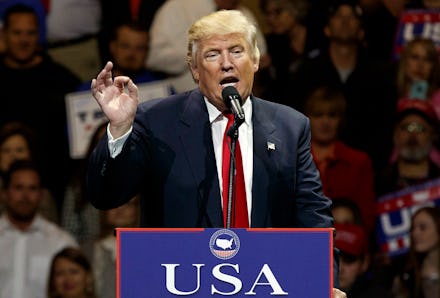3 signs the "Trump effect" is a real thing happening in Europe right now

Republican President-elect Donald Trump's surprise victory in November stunned many political pundits. It has also given rise to the idea that a right-wing populist movement is growing in the United States — and elsewhere.
Trump's win has bolstered conservative populism in Europe, causing some to wonder just how far this "Trump effect" will go?
Though definitely more left-leaning than the U.S., several European nations are witnessing a resurgence in conservative movements. Here are three signs that the Trump effect is a legitimate thing in Europe right now.
The Brexit vote
The United Kingdom held a referendum in June that asked voters whether they supported remaining in the European Union or preferred to leave the continental economic collective of nations. The citizens, in very a close election where the margin was less than 4%, chose to leave the EU, a result that surprised a great deal of prognosticators.
That result happened before the election of Trump, but it was almost exactly one year after Trump had announced his intention to run for president. And after the Brexit result, Trump implied he knew it was going to happen — though it seems he was unfamiliar with the term Brexit before it happened.
Italian Referendum fails
Another recent referendum was voted on in Italy on Sunday. A move to amend their constitution to limit the size and powers of their senate (as well as a long list of other proposed reforms) failed to win approval of voters. As a result, Italy's Prime Minister Matteo Renzi plans to resign.
A "no" vote was seen as a strong indication that populism gaining more traction in Italy, a positive sign for the nation's Five Star Movement that espouses similar political leanings to proponents of the UK's Brexit movement.
Rise of conservative populist leaders in Europe
Europeans have also seen a surge in conservative populist leaders as of late. In France, Marine Le Pen is leading the far-right movement, taking conservative positions on immigration and sharing harsh views of Islam. She is seen as the candidate most similar to Trump in the 2017 contests. Recent polls indicate she would lose in the second round of voting, but there's still plenty of time between now and the spring for things to change, and the pollsters have been wrong in the recent past.
Geert Wilders of the Netherlands is another name worth following. Vehemently opposed to immigration, Wilders espouses far-right views on Islam as well, frequently comparing the Quran to Mein Kampf. Wilders is the leader of the Dutch Party for Freedom, and is seen as a favorite to become the next prime minister of the Netherlands in 2017. If successful, Wilders has promised to ban the Quran and close down all mosques in his nation's borders.
But not every rising star on the right in Europe is seeing success. Austrian Norbert Hofer lost a bid to become his nation's president this week. Alexander Van der Bellen, a left-of-center candidate, defeated Hofer by roughly 53% to 47%.
Hofer was seen as a far-right choice in the election. He frequently wore buttons in his suit-jackets that mimicked what Nazis in his country wore in the 1930s, and states he carries a gun wherever he travels as a "natural consequence" of immigration.